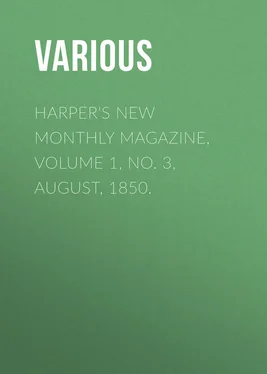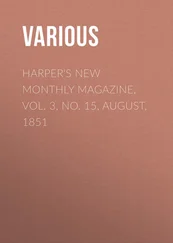Various - Harper's New Monthly Magazine, Volume 1, No. 3, August, 1850.
Здесь есть возможность читать онлайн «Various - Harper's New Monthly Magazine, Volume 1, No. 3, August, 1850.» — ознакомительный отрывок электронной книги совершенно бесплатно, а после прочтения отрывка купить полную версию. В некоторых случаях можно слушать аудио, скачать через торрент в формате fb2 и присутствует краткое содержание. Издательство: Иностранный паблик, Жанр: periodic, foreign_edu, на английском языке. Описание произведения, (предисловие) а так же отзывы посетителей доступны на портале библиотеки ЛибКат.
- Название:Harper's New Monthly Magazine, Volume 1, No. 3, August, 1850.
- Автор:
- Издательство:Иностранный паблик
- Жанр:
- Год:неизвестен
- ISBN:нет данных
- Рейтинг книги:5 / 5. Голосов: 1
-
Избранное:Добавить в избранное
- Отзывы:
-
Ваша оценка:
- 100
- 1
- 2
- 3
- 4
- 5
Harper's New Monthly Magazine, Volume 1, No. 3, August, 1850.: краткое содержание, описание и аннотация
Предлагаем к чтению аннотацию, описание, краткое содержание или предисловие (зависит от того, что написал сам автор книги «Harper's New Monthly Magazine, Volume 1, No. 3, August, 1850.»). Если вы не нашли необходимую информацию о книге — напишите в комментариях, мы постараемся отыскать её.
Harper's New Monthly Magazine, Volume 1, No. 3, August, 1850. — читать онлайн ознакомительный отрывок
Ниже представлен текст книги, разбитый по страницам. Система сохранения места последней прочитанной страницы, позволяет с удобством читать онлайн бесплатно книгу «Harper's New Monthly Magazine, Volume 1, No. 3, August, 1850.», без необходимости каждый раз заново искать на чём Вы остановились. Поставьте закладку, и сможете в любой момент перейти на страницу, на которой закончили чтение.
Интервал:
Закладка:
The king took possession of these fair grounds at Chelsea, and all the chancellor's other property, namely, Dunkington, Trenkford, and Benley Park, in Oxfordshire, allowing the widow he had made, twenty pounds per year for her life, and indulging his petty tyranny still more, by imprisoning Sir Thomas's daughter, Margaret, "both because she kept her father's head for a relic, and that she meant to set her father's works in print."
We were calling to mind more minute particulars of the charities and good deeds of this great man, when, standing at the moment opposite a grave where some loving hand had planted two standard rose-trees, we suddenly heard a chant of children's voices, the infant scholars singing their little hymn; the tune, too, was a well-known and popular melody, and very sweet, yet sad of sound; it was just such music, as for its simplicity, would have been welcome to the mighty dead; and, as we entered among the little songsters, the past faded away, and we found ourselves speculating on the hopeful present.
We close Mrs. Hall's pleasant sketches of Sir Thomas More and his localities, with a brief description of a scene in his prison, which the pencil of Mr. Herbert, of the Royal Academy, has beautifully depicted. It must be remembered that More was a zealous Roman Catholic. He was committed to the Tower in 1534, by the licentious Henry VIII., partly to punish him for refusing to assist that monarch in his marriage with Anne Boleyn, "the pretty fool," as Mrs. Hall calls her; but particularly because he declined to acknowledge the king's ecclesiastical supremacy as head of the Reformed Church. There he remained until his execution the following year. "During his imprisonment," says his son-in-law and biographer, Roper, who married his favorite daughter Margaret, "one day, looking from his window, he saw four monks (who also had refused the oath of supremacy) going to their execution, and regretting that he could not bear them company, said: 'Look, Megge, dost thou not see that these blessed fathers be now going as cheerful to their death, as bridegrooms to their marriage? By which thou may'st see, myne own good daughter, what a great difference there is between such as have spent all their days in a religious, hard, and penitential life, and such as have (as thy poore father hath done) consumed all their time in pleasure and ease;'" and so he proceeded to enlarge on their merits and martyrdom. His grandson, Cresacre More, referring to this scene, says, "By which most humble and heavenly meditation, we may easily guess what a spirit of charity he had gotten by often meditation, that every sight brought him new matter to practice most heroical resolutions."
A BUFFALO CHASE
Early on the 4th we inspanned and continued our march for Booby, a large party of savages still following the wagons. Before proceeding far I was tempted by the beautiful appearance of the country to saddle horses, to hunt in the mountains westward of my course. I directed the wagons to proceed a few miles under guidance of the natives, and there await my arrival. I was accompanied by Isaac, who was mounted on the Old Gray, and carried my clumsy Dutch rifle of six to the pound. Two Bechuanas followed us, leading four of my dogs. Having crossed a well wooded strath, we reached a little crystal river, whose margin was trampled down with the spoor of a great variety of heavy game, but especially of buffalo and rhinoceros. We took up the spoor of a troop of buffaloes, which we followed along a path made by the heavy beasts of the forest through a neck in the hills; and emerging from the thicket, we beheld, on the other side of a valley, which had opened upon us, a herd of about ten huge bull buffaloes. These I attempted to stalk, but was defeated by a large herd of zebras, which, getting our wind, charged past and started the buffaloes. I ordered the Bechuanas to release the dogs; and spurring Colesberg, which I rode for the first time since the affair with the lioness, I gave chase. The buffaloes crossed the valley in front of me, and made for a succession of dense thickets in the hills to the northward. As they crossed the valley by riding hard I obtained a broadside shot at the last bull, and fired both barrels into him. He, however, continued his course, but I presently separated him, along with two other bulls, from the troop. My rifle being a two-grooved, which is hard to load, I was unable to do so on horseback, and followed with it empty, in the hope of bringing them to bay. In passing through a grove of thorny trees I lost sight of the wounded buffalo; he had turned short and doubled back, a common practice with them when wounded. After following the other two at a hard gallop for about two miles, I was riding within five yards of their huge broad sterns. They exhaled a strong bovine smell, which came hot in my face. I expected every minute that they would come to bay, and give me time to load; but this they did not seem disposed to do. At length, finding I had the speed of them, I increased my pace; and going ahead, I placed myself right before the finest bull, thus expecting to force him to stand at bay; upon which he instantly charged me with a low roar, very similar to the voice of a lion. Colesberg neatly avoided the charge, and the bull resumed his northward course. We now entered on rocky ground, and the forest became more dense as we proceeded. The buffaloes were evidently making for some strong retreat. I, however, managed with much difficulty to hold them in view, following as best I could through thorny thickets. Isaac rode some hundred yards behind, and kept shouting to me to drop the pursuit, or I should be killed. At last the buffaloes suddenly pulled up, and stood at bay in a thicket, within twenty yards of me. Springing from my horse, I hastily loaded my two-grooved rifle, which I had scarcely completed when Isaac rode up and inquired what had become of the buffaloes, little dreaming that they were standing within twenty yards of him. I answered by pointing my rifle across his horse's nose, and letting fly sharp right and left at the two buffaloes. A headlong charge, accompanied by a muffled roar, was the result. In an instant I was round a clump of tangled thorn-trees; but Isaac, by the violence of his efforts to get his horse in motion, lost his balance, and at the same instant, his girths giving way, himself, his saddle, and big Dutch rifle, all came to the ground together, with a heavy crash right in the path of the infuriated buffaloes. Two of the dogs, which had fortunately that moment joined us, met them in their charge, and, by diverting their attention, probably saved Isaac from instant destruction. The buffaloes now took up another position in an adjoining thicket. They were both badly wounded, blotches and pools of blood marking the ground where they had stood. The dogs rendered me assistance by taking up their attention, and in a few minutes these two noble bulls breathed their last beneath the shade of a mimosa grove. Each of them in dying repeatedly uttered a very striking, low, deep moan. This I subsequently ascertained the buffalo invariably utters when in the act of expiring.
On going up to them I was astonished to behold their size and powerful appearance. Their horns reminded me of the rugged trunk of an oak-tree. Each horn was upward of a foot in breadth at the base, and together they effectually protected the skull with a massive and impenetrable shield. The horns, descending and spreading out horizontally, completely over-shadowed the animal's eyes, imparting to him a look the most ferocious and sinister that can be imagined. On my way to the wagons I shot a stag sassayby, and while I was engaged in removing his head a troop of about thirty doe pallahs cantered past me, followed by one princely old buck. Snatching up my rifle, I made a fine shot, and rolled him over in the grass.
Читать дальшеИнтервал:
Закладка:
Похожие книги на «Harper's New Monthly Magazine, Volume 1, No. 3, August, 1850.»
Представляем Вашему вниманию похожие книги на «Harper's New Monthly Magazine, Volume 1, No. 3, August, 1850.» списком для выбора. Мы отобрали схожую по названию и смыслу литературу в надежде предоставить читателям больше вариантов отыскать новые, интересные, ещё непрочитанные произведения.
Обсуждение, отзывы о книге «Harper's New Monthly Magazine, Volume 1, No. 3, August, 1850.» и просто собственные мнения читателей. Оставьте ваши комментарии, напишите, что Вы думаете о произведении, его смысле или главных героях. Укажите что конкретно понравилось, а что нет, и почему Вы так считаете.












